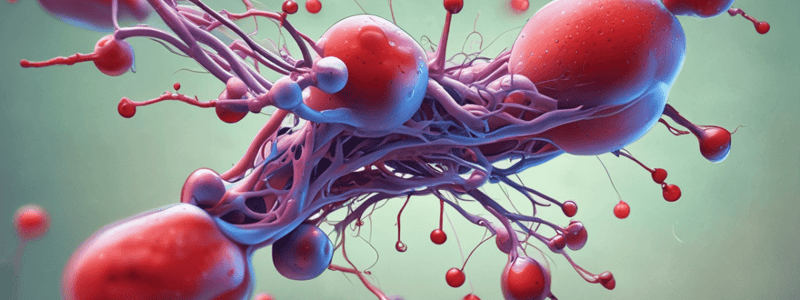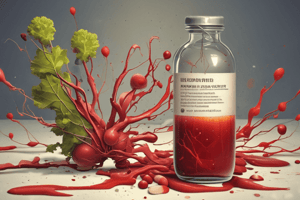Podcast
Questions and Answers
Why are Gla residues of prothrombin effective in chelating positively charged calcium ions?
Why are Gla residues of prothrombin effective in chelating positively charged calcium ions?
- Because they are hydrophobic
- Because they bind to phospholipids
- Because they are positively charged
- Because of two adjacent, negatively charged carboxylate groups (correct)
What is the role of the prothrombin-calcium complex in blood clotting?
What is the role of the prothrombin-calcium complex in blood clotting?
- It catalyzes the formation of fibrin
- It binds to phospholipids essential for blood clotting (correct)
- It converts thrombin to prothrombin
- It initiates platelet aggregation
Which foods are rich sources of Vitamin K?
Which foods are rich sources of Vitamin K?
- Cabbage, kale, and spinach (correct)
- Apples and bananas
- Chicken and fish
- Carrots and tomatoes
What is a primary reason newborns are at risk for Vitamin K deficiency?
What is a primary reason newborns are at risk for Vitamin K deficiency?
What dose of Vitamin K is recommended as a prophylactic measure for newborns?
What dose of Vitamin K is recommended as a prophylactic measure for newborns?
What are some potential toxic effects of prolonged administration of synthetic Vitamin K (menadione) in infants?
What are some potential toxic effects of prolonged administration of synthetic Vitamin K (menadione) in infants?
Flashcards are hidden until you start studying
Study Notes
Prothrombin and Platelet Interaction
- The Gla residues of prothrombin have a strong chelating effect on positively charged calcium ions due to their two adjacent, negatively charged carboxylate groups.
- The prothrombin-calcium complex binds to phospholipids on the surface of platelets, essential for blood clotting.
- Attachment to platelets increases the rate of proteolytic conversion of prothrombin to thrombin.
Vitamin K Distribution and Requirement
- Vitamin K is found in various food sources, including cabbage, kale, spinach, egg yolk, and liver.
- The bacteria in the gut also synthesize vitamin K.
- The recommended daily intake of vitamin K is 120 µg for adult males and 90 µg for adult females.
Vitamin K Deficiency in Newborns
- Newborns have sterile intestines, lacking the bacteria that synthesize vitamin K.
- Human milk provides only about one-fifth of the daily requirement for vitamin K.
- A single intramuscular dose of vitamin K is recommended for newborns as prophylaxis against hemorrhagic disease.
Vitamin K Toxicity
- Prolonged administration of large doses of synthetic vitamin K (menadione) can cause hemolytic anemia and jaundice in infants.
- Toxic effects occur due to damage to red blood cell membranes.
- Synthetic vitamin K is no longer used to treat vitamin K deficiency.
- There is no established upper limit for vitamin K consumption.
Studying That Suits You
Use AI to generate personalized quizzes and flashcards to suit your learning preferences.




